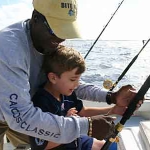
In my last post, I used fishing and learning to fish as an analogy for innovation. I explained that having technical skills like knowing how to bait a hook doesn’t mean you know how to find and catch fish, just as having expertise doesn’t mean you know to come up with new ideas or which ideas will be successful. The critical capability isn’t knowing how to fish or having all the answers; it’s knowing how to go about finding the fish and discovering the answers we need.
There are a number of important lessons about innovation that can be taken from fishing, lessons like:
1) To be successful, you have to keep putting your line in the water. Whether you’re trolling for fish or the next great new consumer product, you’re not likely to get there on the first attempt, and if you do it’s likely due as much to luck as to skill. You’re going to have to make multiple attempts if you expect to land the big one.
2) The where and the when are just as important as the what. The best bait and the most skilled casting aren’t enough when you’re not where the fish are. Skill is important but so is timing and being in the right place. And you can’t always know in advance where or when that is. (See #1.) Many great ideas have come too soon or too late to succeed, or were tried in the wrong place.
3) When it isn’t working or it didn’t work when you tried it before, that doesn’t mean it won’t ever work. Every fisher and innovator knows that sometimes things work and sometimes things don’t. What didn’t work at all yesterday might be the best solution today. The circumstances are different. The timing has changed. (See #2.)
4) When it works, don’t assume it will keep working. Track your successes and try them again when you think it’s appropriate, but don’t assume they’ll work as well every time. A successful fisher knows a variety of techniques because both success and failure are temporary. (See #3.)
5) Failure is part of the process. It’s not that innovators or fishers want to fail, but they accept it and know how to apply what they learn from those failures to gradually discover success. They know that if they’re not failing they’re not really fishing…or innovating. (See #4.)
6) Uncertainty is a given. There’s no way to be certain exactly where the fish will be biting and when you think you know. you’re probably deluding yourself. Worse, it’s an assumption that will probably lead you to stop the kind of systematic exploration you need to practice. The surest way to stop learning is to assume that you already have all the answers. (See #5.)
7) Patience can be your greatest asset. Whether fishing or innovating, you’re going to spend far more time “pursuing” than “catching.” If you can’t find a way to enjoy that process, you’re unlikely to be successful. (See #6.)
8) Stay humble. Former U.S. President Herbert Hoover said, “All men are equal before fish.” The uncertainties of fishing and innovation are great levelers. An innovative idea can come from anybody, and not necessarily whoever came up with one the last time, or from the experts, or from the most experienced. Even a novice can catch a whopper while the veterans get skunked. (See #7.)
9) You can’t control all the variables. No matter how skilled we become at fishing or innovation, we can never anticipate all the challenges we may face or account for all the possible influences on the outcome. We need to become comfortable living in that uncertainty and become skilled at coping with the unknown. (See #8.)
10) When the fish are biting, keep fishing…and don’t be surprised when they suddenly stop. (See #9.)
I suspect that the similarities that have occurred to me are just the beginning of all the ones that can be drawn. What other comparisons would you make between fishing and innovation?
Get the free Special Report, Innovation Essentials: The Four Greatest Ways We stop Ourselves…In Business and in Life. Download a copy at: http://innovatormindset.com/specialreport.htm

Great article. Amazing insights. Perhaps the greatest lesson for me is one on action. Unless you are willing to take action and go to the river, nothing else matters.